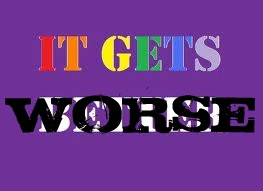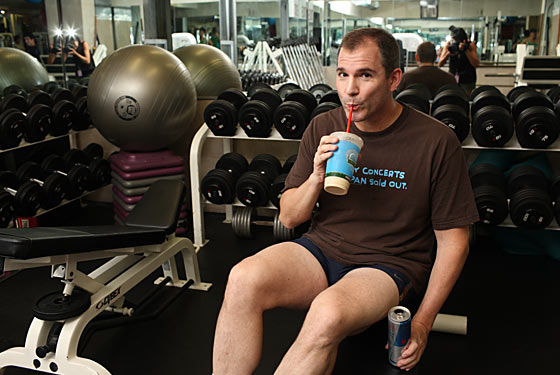A Lot — Basically All — Gay People are Normal and Don’t Deserve Any Special Attention Whatsoever
 Queer Eye for the Straight Guy and Newlyweds were kind of popular shows on the telly when I came to the conclusion that if I were to ever do that disgusting activity that you should probably never do it would be with a boy.
Queer Eye for the Straight Guy and Newlyweds were kind of popular shows on the telly when I came to the conclusion that if I were to ever do that disgusting activity that you should probably never do it would be with a boy.
Sometimes, while flipping through the trillions of telly channels, I would stop on Queer Eye. The snippets that I saw of the “queer eyes” turned and twisted my tummy terribly. They had lots of product in their hair, wore insufferably strange trousers, and, just in general, looked as if they had spent the last gazillion hours scrubbing themselves in a shower stall. All these boys seemed to care about was their bodies. They didn’t watch PG movies or collect teddy bears or commit French poetry to memory. Their primary concern was the appearance of their flesh as well as the flesh of the straight guys that they were making over.
Straight people are just as corporeal as gays. Nick Lachey is a straight boy. He sort of has massive muscles and wears product in his hair. Whenever I saw Nick on the Newlyweds, I said to myself, “I do not want to be like this boy. I want to be like Jessica!” Jessica was quirky and inquisitive. She was thoughtful about that which she interacted with. She asked questions, like why a tuna fish company would name themselves Chicken of the Sea. Nick seemed unable and unwilling to string sentences together. But Jessica was a cute chatterbox, like Anne Frank when she was in school.
There are a multitude of reasons to revile gays. One of them, as Baby Alexander points out in his essay on Tim Dean’s Unlimited Intimacy: Reflections on the Subculture of Barebacking, is their idolization of numbers. Gays are infatuated with integers. San Francisco (obviously) plays host to the Cute Boy Bareback Gang Bang Parties. According to Dean’s research, one boy, Jeff Palmer, took “an astonishing 56 loads.” Another boy, Max Holden, “32 loads at the August 2002 party.” Much like normal straight Capitalist subjects, gays are preponderantly preoccupied with measurable quantities. The average American cares a considerable amount about how much money they make, how many grams of sugar are in their food, how much their therapist charges per hour, and an orgy of other numerical quandaries. Gays do not deviate from these typical Americans. They are not minorities. They subscribe to the same beliefs that straight people do. “Cruising involves opening oneself to the world,” declares Dean. Searching for s-e-x is democratic. America is a democracy. As with gay sex, democracy gives everybody a chance. It’s not selective. It’s not discerning. It’s inclusive, which is infuriating, because not everybody is equal. There are dumb people, and dumb people (e.g. run-of-the-mill homosexuals and heterosexuals) should be pummeled.
One of the most visible and dumbest gays is Frank Bruni. The foodie fatty is the New York Times first openly gay opinion writer, and the opinions that he shares are average. Recently, fatty wrote an open letter to Bill Clinton castigating him for signing the Defense of Marriage Act. According to Frank, DOMA is an “act of indisputable discrimination that codified unequaled treatment of gay men and lesbians” and “denies federal pension, health care, and medical leave benefits to same-sex couples.” Unlike Frank, I want to be discriminated against and treated unequally. I’m not the same as everybody else. Like Lil Wayne, I’m not a generic human being. When I realized that I’d rather have a boyfriend than a girlfriend I was sort of thrilled. I was special. I was separate from my straight buddies whose main concerns were how many bumps they could snort and how many girls they could hustle hands jobs from. I had superior things on my mind. But then I became dispirited when I found out that other boys who like boys acted just like boys who like girls. They were normal, and, as with big-bellied Frank, they desired an average life.
No one who moos for mediocrity should be immune from insult or injury. The typical world anguished Arthur Rimbaud to such an extant that in “What Do We Care, My Heart” he wants it “ravaged,” “sacked,” and “punished.” Civilized continents (Europe and America) will vanish. In their place will be “dark strangers.” Dark things are scary, mysterious, and gothic. They’re like a Henry Selick movie or a Tim Burton one. These directors’ movies are magical. In Burton’s Batman Returns, a penguin is almost elected mayor of Gotham. I’d much rather be ruled by the pugnacious Penguin than the popcorn-eating putz. Penguin doesn’t wear product in his hair. He wears a top hat. Penguin is admirably ashamed of his body. He covers it in make up and intricate outfits (there’s chic cravats). Penguin isn’t superlatively scrubbing his skin for the night’s barebacking bonanza. Penguin, as with Arthur, is destroying the civilized world – the very world that Frankie B want to be a part of.
Penguin is evil, and evilness is exciting and special since it’s the antithesis of the status quo. An actual, indisputable evil is nonexistent. According to the thrilling German boy, Nietzsche, evil is merely a term that the majority attaches to anything that may threaten its power. It’d be inappropriate to label Frank B or his GLADD LGBTQrstuvwxyz cohorts evil. They present no danger to the millions of mediocre Americans. They want to join them. But Arthur, Penguin, and Andy Warhol (who I neglected to mention until now, and I apologize, Andy, for introducing you in this rather hurried manner) are evil. They aspire for more than pensions and medical leave. They want to run guns, carry umbrellas, and drink Coca-Cola. Violence, accessories for rainy weather, sweet fizzy drinks — these things are tasty, fashionable, cute and cutting. Frank thinks gays should be able to “measure up” to normal standards. I sure as h-e-l-l don’t. I want to make my own standards. I want to build my own value system – one not measured in how many hours you worked or how many loads you took, but one that assesses your worth by tabulating the number of times that you watched and read (since it’s a well-written book as well) Selick’s Coraline.
There are very few gays who want to live in a malicious but nonetheless magical world where button eyes are bestowed upon your mommy and daddy. Most gays and, to take a term from Gore Vidal, “homosexualists” resign themselves to telling boys who likes boys and girls who like girls “it gets better.” Larry King, Dan Savage, Bill Maher, &c — hush up! If I was in charge of It Gets Better I would tell the “LGBT community” what J. Jack Halberstam told me – that you can be special and behave as if you’re in a children’s movie. Halberstam’s Queer Art of Failure wants to “poke holes in the toxic positivity of contemporary life.” Halberstam wants to gas happiness and glorify specialness. Dory, the fish in Finding Nemo who helps reunite a father and son, is an example of a special creature. Dory has memory issues, which, according to Halberstam, endows her with “contingent relations.” Each time she interacts with a creature is like the first time. Dory must assess and appraise them as if they were utterly new. She must think. Gay people, like straight people, don’t want to think. They want concrete relations. They want husbands and husbands, wives and wives. This way they won’t have to waste time on thinking about the bright spots and the bad spots of everyone that they meet each time they meet them. They can digest the typical tag in a sec then move on to what’s important to them — carb counting and taking loads. Homosexualists have bare, basically nonexistent brains. But Dory has a big brain, as she must engage in so much consideration.
In order to produce special creatures like Andy, Coraline, Arthur, and probably even Dory and Penguin too, marriage is required. I am not against marriage. There need to be mommies and daddies in the world in order to cultivate unique individuals. These mommies and daddies probably won’t bring up a special creature. If specialness was frequent then it wouldn’t be special. But the possibility of another Arthur or Andy carries enough purchase to uphold the institution of marriage. On this matter, I disagree with Halberstam. But on the issue of thoughtfulness and peculiarity I agree absolutely with her — don’t tell boys who like boys (or girls who like girls) that they can be average and normal: inform them that they can be as amazingly cinematic as a fish in a Pixar movie or Penguin.
Tags: andy warhol, Arthur Rimbaud, Batman Returns, Coca-Cola, coraline, Finding Nemo, Frank Bruni, GLADD, Gore Vidal, Henry Selick, J. Jack Halberstam, Jessica Simpson, LGBTQ, lil wayne, newlyweds, Nick Lachey, queer eye for the straight guy, the new york times, tim burton, Tim Dean



Well I sure as hell ain’t barebacking that Penguin.
this ALMOSt functions doubly as a critique of lil wayne’s 4 year comedown from his peak–“you softer than Roseanne’s son”–(we steady mobbin’)
Back in my day, we also had a lot of attitude, and made lots of us (non-mainstream queers) vs. them (mainstream queers and straights) statements. But we tend to put on the “us” side zines and videos that people made for themselves and their weirdo friends, not Hollywood movies that cost many millions of dollars.
But then I’m old.
well, you just described the primary critique of homonormativity: if queer people want the same life as hetero people, their radical potential is eliminated.
mainstream things can contain just as much sass and specialness as non-mainstream things
Sometimes wanting to be or to appear “normal” is dominant, and sometimes wanting to be or to appear “special” is dominant.
From advertising, for example, these two ‘wants’ seem roughly equally dependably manipulable.
Than being or appearing “special”, critically understanding the pressure to want to be or to appear in any particular way seems more emancipatory.
Hmm, well, yeah, this is the old justice vs. freedom thing.
did you fall in love, get married, buy a house in the ‘burbs, and adopt twin boys from Sub-Saharan Africa?
twin girls from China, actually.
[…] are based on their ability to consume. Practically everyone is a consumer! The fatty faggot Frank Bruni would have an utterly different identity without the New York Times, the food that he previously […]
Ok, sure, most gays–do you only mean males, or is gay serving as umbrella?–are normal, ordinary; but reception is another dynamic–discourse is another dynamic; socialization, or lack thereof, is another dynamic. For me, the tone of this piece–and then tone/register that I associate with you–is utterly gay because it strikes me as an act of extreme negation, of acting cooler than thirty below to keep things slick ‘n easy, to avoid sadness or anger or outrage or, most crucially, vulnerability.
Although it’d be legit to say this is a hugely contradictory swerve, I do find this tone, at times, quite fun.
I’m guessing you are against women-only anthos etc? I am too, tho in a very unstable way.
Am not, largely, on board with predominately heterosexual white-women/gal/girl anthos, is what I meant but did not initally “express.”
I enjoyed reading this before a couple of comments deflated it for me. But grateful to both authors and commenters.
[…] are based on their ability to consume. Practically everyone is a consumer! The fatty faggot Frank Bruni would have an utterly different identity without the New York Times, the food that he previously […]